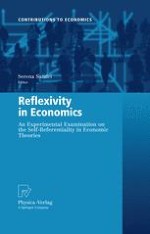2009 | OriginalPaper | Chapter
Self-Referentiality of Economic Theories and Theory Absorption
Published in: Reflexivity in Economics
Publisher: Physica-Verlag HD
Activate our intelligent search to find suitable subject content or patents.
Select sections of text to find matching patents with Artificial Intelligence. powered by
Select sections of text to find additional relevant content using AI-assisted search. powered by
Bounded rational social actors are not just stimulus-response machines but complex beings, whose actions are led by their own beliefs and mental representations. Such representations can shape mental models, subjective theoretical frameworks that predict the course of the social system the actors are involved in and that establish cause-effect relations that the individual uses in her decision-making. Individuals can modify their mental models when they are not satisfied with the results of their application. This operation requires that the individuals are able to reflect the theoretical statements on themselves and on the situation they are confronted with. According to the result of this reflection process, they will then decide which theory they want to refer to, or in other words, which theory they want to absorb.
Economic theories aim at the description and prediction of economic behaviour and interactions, but at the same time interfere with the phenomena they aim to depict. Revealed theories, if accepted, may influence the behaviour of the agents they focus on, either in the sense of validation of the theoretical content, or in that of its rejection.
This analysis tries to discuss the implications of those recursive, or self-reflexive effects of economic theories on bounded rational economic behaving and interacting. In particular, a distinction will be made between the perception of the selfreferentiality of a theory by bounded rational individuals (i.e. the perception of its applicability to a concrete setting) and its absorption (i.e. the compliance of the decision makers with the prescriptions of the theory).
The discrepancy between the neoclassical rationality standard and the observable cognitive limitations that constraint the subjective rationality further complicates the evaluation of the role of mainstream theories in influencing economic interactions and behaviour. The problem of how bounded rational actors process the content of theories of full rationality undoubtedly is worth being explicitly analyzed because it could particularly yield interesting results e.g. for enhancing efficient economic advising. However, normative prescriptions for economic advising could also be taken from theories of bounded rationality if it could be proven that such theories enjoy a broader acceptance by the bounded rational actors and survive to their absorption.
